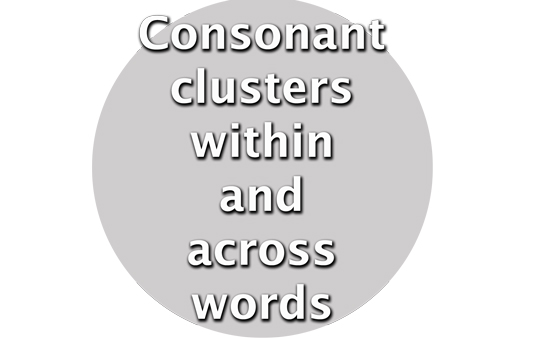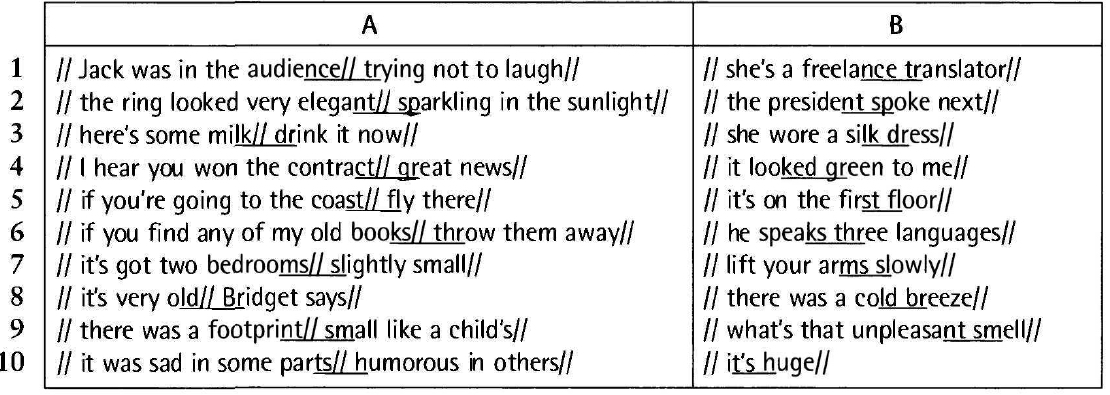Consonant clusters also occur within words. For example:
| Clusters with… | 2 consonant sounds | 3 consonant sounds | 4 consonant sounds |
| escape approach dislike address important |
complete control expert translate hundred |
abstract expression upstream exquisite (ˈe k s k w ɪ z ɪ t) excruciating |
Note: Some clusters found within words can also be found at the beginning of words (dislike – slow), at the end of words (important – lamp), or both (escape – Scotland/ask); but others can’t (abstract,
invisible).
When a word ending with a consonant or consonants is followed by a word beginning with a consonant or consonants, a new consonant cluster across words is formed. These can be particularly difficult to pronounce when they come within a speech unit without a pause.
// it’s an elm tree//
// there’s a children’s playground//
When consonant clusters are divided by a pause, they are often easier to pronounce:
// if Tom can’t take you to the film// try Mike//
// there’ll be three suitcases// two of Joan’s// plus my own//
All the consonant clusters within the speech units in this conversation are underlined. Listen and follow notes. Some clusters are simplified with sounds left out or changed to make them easier to pronounce.
Words that commonly go together in phrases and compounds are generally said within speech units. Consonants at the word boundaries are usually run together in a cluster. For example:
| Clusters with… | 2 consonant sounds | 3 consonant sounds | 4 consonant sounds |
| civil servant cough medicine electric fence full marks language lab |
vacuum cleaner flash flood asking price present simple passive smoking |
television screen winning streak false friends lunch break film credits |
Exercise 1
Underline all the consonant clusters within the words in this text (i.e. not at the beginning or end of words). Note that some words have two consonant clusters. An example is given at the beginning of the text.
When I started playing badminton, I was sixty and I hadn’t done any strenuous exercise for almost twenty years. But after just a few months I’d won the over-fifties national championship and an international competition. My husband thinks I’m crazy and that I’ll injure myself. But I’ve found a number of advantages in taking up a sport. I feel much healthier, and it’s important to be active at my age. And meeting new people has improved my social life. So I’ll carry on playing until I get too old.
Now check your answers and read the text aloud, focusing on the pronunciation of words with underlined consonant clusters.
When I started playing badminton. I was sixty and I hadn’t done any strenuous (/ˈs t r ɛ n j ʊ ə s /) exercise (/ˈe k s ə s aɪ z /) for almost twenty years. But after just a few months I’d won the over-fifties
national championship and an international competition. My husband thinks I’m crazy and that I’ll injure myself. But I’ve found a number of advantages in taking up a sport. I feel much healthier, and it’s important to be active at my age. And meeting new people has improved my social life. So I’ll carry on playing until I get too old.
Exercise 2
Listen and repeat phrase 1 in column A with a slight pause between the two speech units. Then listen and repeat phrase 1 in column B, making sure you run the words together without a pause. Then do the same for phrases 2-10 (notice that the underlined clusters are the same in columns A and B).
Some underlined consonant clusters in column B are simplified. Try to make the same simplifications when you repeat them.
1 // she’s a freelance translator// (no simplification)
2 // the president spoke next// (/t/ is shortened)
3 // she wore a silk dress// (/k/ is shortened)
4 // it looked green to me// (/t/ is left out)
5 // it’s on the first floor// (/t/ is left out)
6 // he speaks three languages// (no simplification)
7 // lift your arms slowly// (‘…s s…’ make one lengthened /s/ sound)
8 // there was a cold breeze// (/d/ is left out)
9 // what’s that unpleasant smell// (/t/ is left out)
10 // it’s huge// (no simplification)
Exercise 3
Match a word from box A with a word from box B to make compound nouns. Say the compounds aloud, making sure you run the words in the compound together.
| A | B |
| blood direct general golf lamp first passive rock lost speech time tourist |
club property music poisoning class shade smoking speech strike therapist trap travel |
EXAMPLE: blood poisoning (/d/ in ‘blood’ is pronounced like /b/)
Listen, check your answers and repeat the compounds, making the same simplifications of consonant clusters where these occur.
The most likely answers are:
direct speech (/t/ is left out)
general strike (no simplification)
golf club (no simplification)
lamp shade (no simplification)
first class (/t/ is left out)
passive smoking (no simplification)
rock music (/k/ is shortened)
lost property (/t/ is left out)
speech therapist (no simplification)
time travel (no simplification)
tourist trap (/t/ is left out)



Thank you tips fore english . com for helping me in consonant cluster.
It is simple and easy to teach